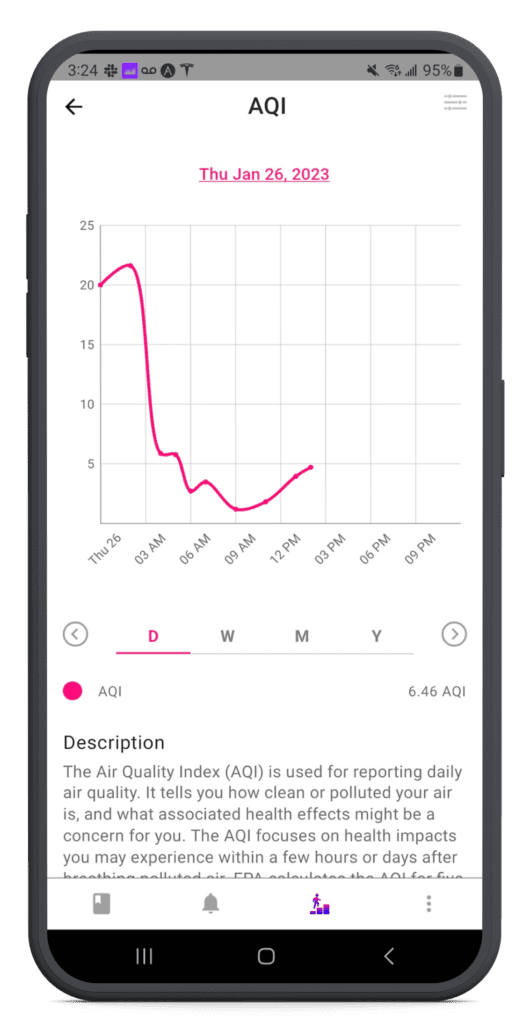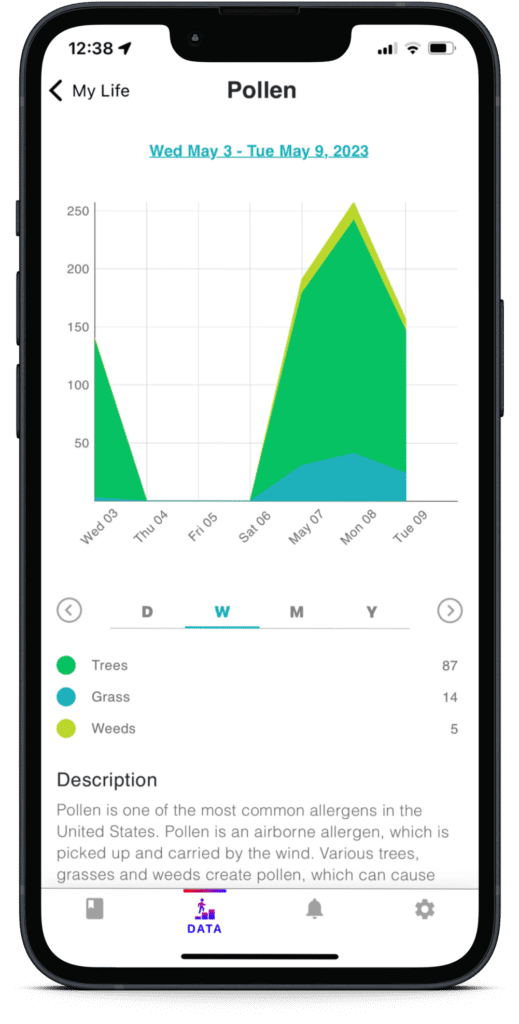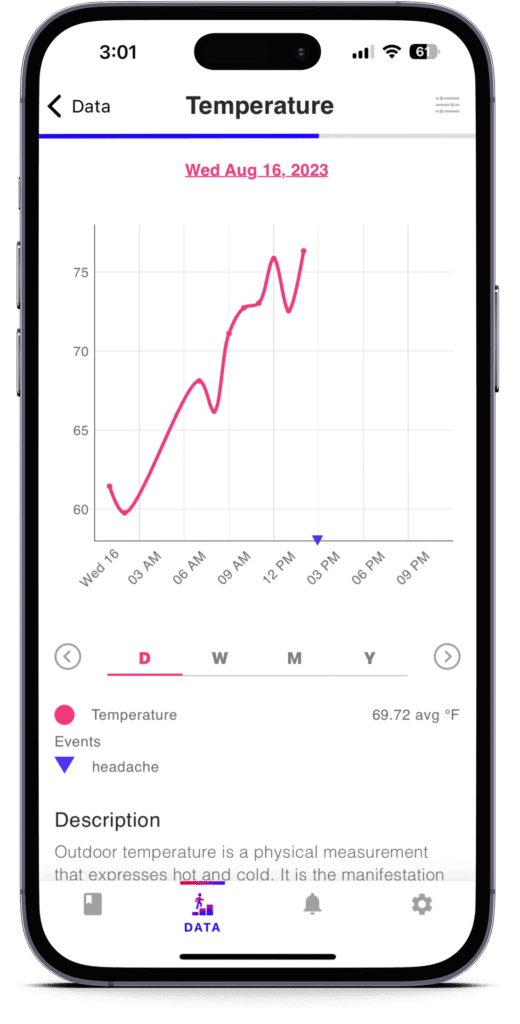Weather and Health Data Can Enhance Your Wellness Routine
Hey, weather and health enthusiasts! Ever wonder how the place you call home affects your well-being? Whether it’s a bright and sunny day that gives us a natural high or a cloudy, gloomy one that makes us want to curl up in our warm blankets, the weather and our health interact intimately.
Today, let’s take a deep dive into the fascinating connection between weather and health. We’ll explore how location-based data in a weather and health app can amp up your well-being game. And, of course, we’ll also chat about some nifty ways to stay informed about how your environment affects your health.
Some Weather and Health Interactions
Did you know that whether you’re navigating an urban jungle or basking in sunny coastal towns, the local environment can impact your health? Yup, that’s right! A host of factors, including air quality, temperature, humidity levels, altitude, and allergens, can all harm your well-being.
Air Quality
For example, suppose you live in busy urban areas with heavy traffic. In that case, you might be exposing yourself to higher levels of air pollution, a significant contributor to respiratory issues and allergies.
Temperature
Hot, humid weather can sometimes make breathing feel like a marathon, especially for folks with preexisting lung conditions. The combination of heat and humidity can create a heavy, muggy atmosphere that makes it harder for our lungs to do their thing. And if that’s not enough, air pollution tends to worsen when it’s hot, adding another layer of difficulty for our respiratory system.
Related: Track Environment and Symptoms All In One Place, the Best Life app
But guess what? It’s not just the blazing heat that can cause trouble. Extreme cold weather can also challenge our cardiovascular health and even worsen conditions like asthma. When it’s freezing outside, our blood vessels constrict, which can put extra strain on our hearts. And let’s not forget about the impact on body temperature regulation. Our bodies work hard to maintain a cozy internal temperature, but extreme cold can throw a wrench in the works, making it harder to keep warm and comfortable.
Humidity
Meanwhile, high humidity levels can make you feel quite icky and be a breeding ground for microscopic organisms that trigger respiratory illness. Conversely, low humidity can lead to skin and respiratory dryness.
Allergens
Plus, let’s not forget pesky allergens such as pollen, mold spores, and other culprits that trigger allergic reactions – causing symptoms like sneezing, itching, and watery eyes.
Related: Tips for Effectively Using Allergy Symptom Trackers
Altitude
Have you ever hiked up a mountain or visited a place with a higher altitude than you’re used to? Altitude sickness is a common ailment that can strike when you’re in high places – it’s no joke! And when combined with other environmental factors, altitude can severely affect your health and well-being.

The little-known connection between weather, altitude, and health
Let me share a little about how I discovered something interesting about the weather and its impact on health. Picture this: It was a bright and sunny morning, the perfect day for a hike in the mountains. Excited and armed with my snack-filled backpack, I set off on the trail, ready to conquer nature and get my dose of exercise.
As I climbed higher, soaking in the breathtaking views, I couldn’t help but notice a drop in temperature and the refreshing feel of the mountain air. But here’s where things took an unexpected turn. At a certain altitude, I started experiencing a pounding sensation in my head, and my heart seemed to be racing even though I wasn’t pushing myself as hard as usual.
What happened with the weather and my health?
Unsure of what was happening, I researched when I got back home and uncovered a fascinating connection between high altitudes and our health. The decrease in oxygen levels at higher elevations can trigger something called altitude sickness.
Altitude sickness can manifest in various ways, including headaches, dizziness, nausea, and fatigue. Even seasoned hikers like myself can be affected by the change in barometric pressure and reduced oxygen availability at higher altitudes.
With this newfound knowledge, I started paying closer attention to weather reports before planning mountain adventures. I learned that weather patterns, such as sudden drops in barometric pressure or significant temperature shifts, can worsen altitude sickness symptoms.
This personal experience truly opened my eyes to the importance of understanding how weather, related to altitude or other factors, can impact our health. It’s remarkable how something as innocent as a change in weather can affect our well-being.
Reasons to Use Weather and Health Apps
Let’s dive into a nifty tool that can help you make the most of your local environment: weather and health apps like Best Life! These apps are fantastic because they use location-based data to give you personalized insights into how the weather can affect your health. Plus, they offer some handy suggestions for staying well.
Related: See All the Data Best Life Can Show and Store for You
Weather and health apps are like little companions that provide valuable insights to keep you healthy in your environment. Go ahead, give them a try. Let these tools be your trusty sidekicks on your journey toward better health.
Let’s check out what weather and health apps give users to help their well-being:

Air Quality Index (AQI)
Breathing in clean air is important, especially if you have respiratory conditions. That’s where weather and health apps come into play. Some of them now include the Air Quality Index (AQI), which gives you insights into the current air quality in your area. With this information, you can make informed decisions about your outdoor activities and take extra precautions when needed.
Allergen Alerts
You know those days when pollen or mold is running rampant? Weather apps have got you covered. They’ll send you notifications about high pollen or mold counts in your area so you can take precautions and effectively manage your allergies.

Barometric Pressure
Arthritis and joint pain
Sudden changes in barometric pressure, like the switch that happens right before a storm, can trigger joint pain. According to some studies, changes in barometric pressure can affect the tissues around your joints, causing them to expand or contract. This, in turn, puts pressure on your nerves and can cause pain. So, the next time you feel some aches and pains coming on, maybe take a look at the weather forecast to see if any stormy weather is on its way.
Related: What Causes Arthritis Symptoms? Five Triggers to Know
Headaches and migraines
Barometric pressure can be a headache for some, though the reason is unclear. It might affect the pressure in the brain or how the brain blocks pain, or it might be evolutionary, as it keeps humans in tune with their environment.
UV Index
Protecting your skin from those harmful UV rays is a must. Luckily, weather apps often provide UV index information. This nifty feature helps you plan your outdoor activities and decide whether you need sunscreen or protective clothing to keep your skin safe.

Temperature and Humidity
Whether planning a jog or a leisurely stroll, weather and health apps have your back. They give you real-time temperature and humidity updates so you can dress accordingly and stay comfortable while enjoying your time outdoors.
Arthritis and joint pain
Now, let’s chat about cold weather and joint fluid thickness. When temperatures drop, your body adjusts to keep you warm, which can cause changes in the fluid around your joints. Some research suggests that cold weather can cause joint fluids to thicken, making movement less comfortable and even painful.
Sounds pretty unpleasant, right? But don’t worry; you don’t have to let the cold weather stop you from doing the things you love. Simply layer up, stay warm, and practice gentle exercises to keep your joints moving smoothly.
Diabetes and blood sugar
According to the expert biometeorologist Jennifer Vanos, any front is associated with low pressure, which means that the viscosity or thickness of your blood can increase during cold fronts. It sounds all scientific, but the bottom line is that colder weather can affect your blood, making it harder to control blood sugar.
This may be especially tricky for diabetics, as cold fronts can worsen insulin resistance and make it harder to regulate blood sugar levels. But hey, listen up, warrior: you’re not alone in this. It’s important to contact your healthcare provider for guidance on adjusting your medication or meal plan during these times. You’ve got this!
Related: Best Life: The Ultimate Diabetes App for Patients and Caregivers
Altitude
Pulse oxygen saturation
Now, let’s chat about altitude sickness. It’s a real thing, and it can be seen in pulse oxygen saturation data. According to a study published on PubMed, pulse oximetry (a fancy term for measuring the oxygen levels in your blood) is a valuable tool for evaluating individuals suffering from altitude sickness. When you ascend to higher altitudes, the oxygen concentration in your blood decreases, which can lead to altitude sickness. Tracking pulse oxygen saturation data during high-altitude hikes helps identify and diagnose altitude sickness.
Blood pressure
Even scarier, altitude has an impact on your blood pressure. According to biometeorologist Jennifer Vanos, PhD, your blood pressure also drops when atmospheric pressure decreases. In addition, low temperatures narrow your blood vessels, resulting in lower blood pressure overall during the summer months.
Access Weather and Health Data
Besides using weather apps, there are other ways to stay informed and make healthy choices, no matter how unpredictable the weather may be.
Local Weather Forecast
Beyond the wonderful world of weather apps, watch your favorite weather service for those local forecast updates. Regularly checking the forecast allows you to plan ahead like a boss. You can reschedule outdoor activities if the air quality isn’t great or even adjust your exercise routine when extreme temperatures appear. Stay one step ahead of Mother Nature and be the master of your plans!
Know Your Triggers Around Weather and Health
Now, it’s important to understand your triggers if you’re dealing with specific health conditions like asthma or allergies. But guess what? You can take it a step further! Start connecting the dots between your triggers and certain weather conditions. By doing so, you’ll become a superhero at managing your symptoms proactively.
Related: How a Symptom Diary Improves Medical Care
For example, if you notice that your asthma flares up when it’s windy or that your allergies go wild during high pollen days, you can plan accordingly and take preventive measures to keep yourself feeling awesome.
Speak with Healthcare Providers about Weather and Health Concerns
If you ever find yourself in a weather-related health dilemma and have concerns about how the elements affect you, don’t hesitate to contact your healthcare provider. They’re the superheroes of health, after all! Chatting with them lets you get personalized advice and strategies to tackle any weather-related challenges head-on. They’ll help you come up with a game plan that suits your unique needs. Trust me, their support and guidance can make a difference.
Final Thoughts on Weather and Health
As we’ve explored, your local environment and the weather can have a tangible impact on your health and well-being. By utilizing location-based data in weather and health apps, you can stay informed about the conditions around you and make healthier choices accordingly. Remember to embrace the power of knowledge, and don’t be afraid to seek guidance from healthcare professionals when needed. So, whether basking in the sunshine or facing a rainy day, you have the tools to stay one step ahead and keep yourself in the best shape possible. Stay weather-aware, my friends!
Sources
It’s essential to back up our claims with reliable sources. Here are the references for the information provided:
13 Ways Weather Affects Your Health — Without You Knowing
Can Changes in Weather Affect Your Health?
Climate Impacts on Human Health
Feeling Under the Weather? Here’s How Weather Can Affect Your Health
Pulse oximetry at high altitude
The Heart and Pulmonary Circulation at High Altitudes
These sources prove the weather in your environment affects your health in many ways. This blog provides general information and should not replace professional medical advice. Always consult a healthcare provider for personalized guidance regarding your health and its relation to weather conditions. Stay informed, stay updated, and take care of yourself!
Who We Are
The Live Learn Innovate Foundation is a 501(c)3 nonprofit entity that empowers software users to regain control of their personally generated health data, gain intuitive insights about their social data, learn the impact of their environment on health, and build a foundation of data analytics that empowers research, academics, and innovation in economic development.
Use cases for this secure, private data aggregation method appear everywhere, expanding to family care, community growth, agricultural planning, and many more things still unseen. Help us keep going by getting involved today.
One Response